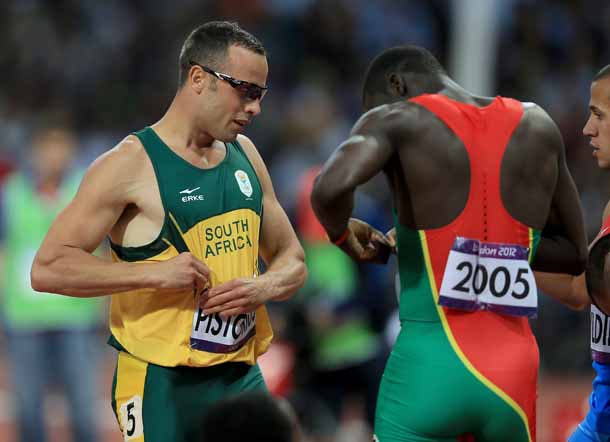
INSPIRATIONAL moment from the Olympics: Winner of 400m, James from small nation of Grenada, exchanging bibs out of respect for double amputee Pistorius who made it to the semifinals
During many Olympic Games, the format and scheduling of the TV broadcasts by NBC and their counterparts have caused a sometimes irritated debate about what the Games are all about: are they a pure sports event, should they be seen as news reporting, or are they primarily a show/entertainment. Many viewers want to see the events in detail as they happen, without too many background stories. Others want to see the key moments of the competition, combined with the underlying ‘human interest’ stories. Yet others see it simply as an entertaining alternative to less exciting summer programs on TV. Now, of course, it is possible to view it in any way you want, assuming you can get instant news through the internet and, as was now the case from London, ‘live streaming’ from any event that you want to follow in detail. So you do not need to depend on the main NBC show that comes many hours later and is very much a show.
Then there is the question of ‘for whose sake’ do we have the Olympics. Are they organized in order to enable athletes to have an opportunity to display their abilities and to gain fame and financial benefit; or do not these athletes already have sufficient events in their respective sports? Sometimes one gets the impression that the Games are held to provide the host country/city an opportunity to show off their ability and to draw a larger than usual number of visitors from abroad. More awkwardly, one also senses that the Games serve largely as a chance for sponsors and other advertisers to gain a captive audience, and that the commercial interests overwhelm the sports considerations.
If one follows the media coverage, one could almost get the impression that it is a fight between nations, albeit it in a less friendly format, to show their power and compete for global dominance. More than anything else, the table with the medal count is what stands out. Of course, this is discouraged by the International Olympic Committee, which at one point refused to release information about the official medal count. (The IOC Charter even emphasizes that it is supposed to be a competition between athletes and not between countries). But this does not work, as media simply then would do the work themselves, moreover in several conflicting versions. Personally I am ‘sick and tired’ of this focus. For me it would be more appropriate to have countries compete on the basis of accomplishments in education, health care, technology, governance and other more fundamental aspects of life.
But it seems inevitable that countries, both the largest ones in the world and the small, emerging ones, will want to use the Olympic Games to show off. It even goes quite far in terms of efforts to ‘recruit’ athletes to reinforce the population. Many countries attract immigrants and refugees, in which case a change in nationality is natural and the acquisition of a star athlete is incidental and unquestioned. But there also seem to be some countries, including the 2012 host country where, perhaps due to lingering colonial traditions or simply a financial edge, systematic efforts are made to find reinforcements in time for the Olympics. Immigration laws sometimes seem designed to facilitate such methods. One prime example in London was a female participant in triple jump, who now participated with her third nationality in four Olympic Games. It seems that globalization also tends to create a ‘mercenary corps’ of athletes. Ironically, this is in a sense what fits the notion I mentioned from the IOC charter, but unfortunately it fits even better with the actual nationalistic fervor that countries display.
My own ideas may be ‘old-fashioned’, but as you will have understood, I do not care to see the Olympic Games as a venue just for top athletes to increase their market value, for countries and their National Olympic Committees to show off, or for global conglomerates to do far-reaching advertising. For me the main consideration is to have the Olympic Games serve as a source of INSPIRATION. This could mean many different things. It could obviously involve the inspiration for young, budding athletes to make the effort to become future stars. But it could also involve the notion that it simply encourages a broader participation in sports and physical activity instead of less healthy alternatives. It could provide illustrations of how a determined and sustained effort can lead to remarkable achievements. It can show how handicaps and a difficult living environment can be overcome. (I do not much admire a ‘dream team’; I cheer the ‘underdog’ who is able to defeat the odds). And it can remind us that fair play and a sporting spirit do not need to be sacrificed in the pursuit of medals and results. So for me, the Olympic Games can (and should) be a source of inspiration that goes well beyond the world of sports.
